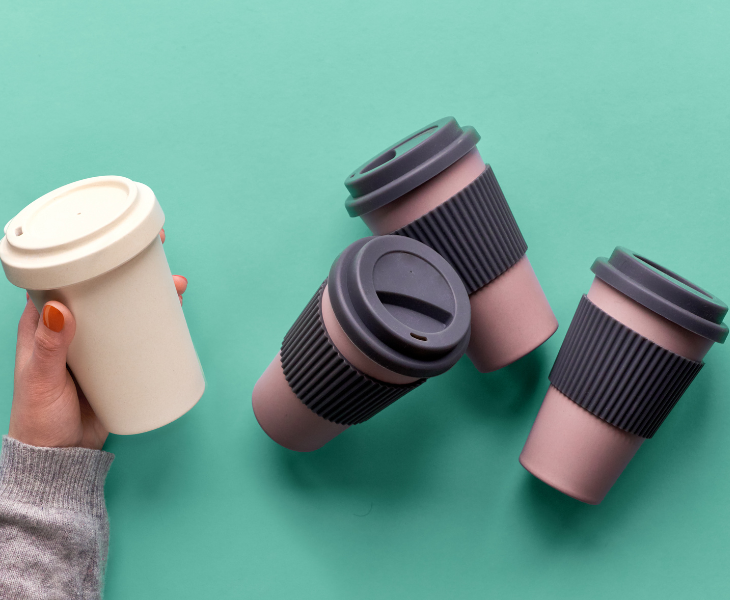Coffee shouldn’t cost the earth, but unfortunately, it does – namely, takeaways. We’re all prone to striding out of cafés clutching our disposable coffee cups to go – it’s a modern lifestyle habit. In Australia, it’s estimated around 1.84 billion disposable coffee cups are used each year – that’s 2.7 million disposable cups discarded every day!
The Cost of Coffee Cups
Although they look like they are made of paper, disposable coffee cups are coated with a thin layer of single-use plastic on the lids and linings to make them leak proof (few are home compostable plastics meeting Australian standards). As such, these plastic lined coffee cups are notoriously difficult to recycle; not recyclable via most local council kerbside collection programs and currently accepted for recycling in only a handful of council collections.
When well-meaning folk erroneously place their coffee cups in recycling bins, this can contaminate the higher value plastic that can be recycled – often resulting in the entire load bound for landfill. And with their plastic content, most can’t be efficiently processed in paper recycling mills, so the majority are incinerated, or sent to landfill.
BioPak estimate up to 90 percent of single-use hot beverage cups head to landfill. Sadly, these also end up in the natural environment: according to datasets that include Clean Up Australia, Keep Australia Beautiful and the Australian Marine Debris Initiative, coffee cups are some of the most habitually littered items on this continent.
With the exception of Tasmania, most States and Territories have already banned, or are committed to banning, single-use plastics, including plastic lightweight carrier bags, straws, drink stirrers, cutlery, and plates and bowls. Curiously, just two states, South Australia and Western Australia, have committed to banning coffee cups containing plastics, earmarked for 2024, while for banning plastic cups and lids, only Western Australia has committed to this, in 2023, and South Australia, for 2024.
Health matters
However, it’s not just the environment that’s affected, but also your health. The plastic coating of disposable coffee cups has the potential to degrade into microplastics over time, especially if the cups are exposed to heat or moisture. If you drink coffee regularly from a takeaway cup, there’s a good possibility that you’re consuming microplastics daily. Most of these plastic linings are regarded as ‘safe’ but have been shown to leak estrogenic chemicals, which infiltrate your body system. And once entering the ocean, coffee cups and lids break down into pieces that resemble food; fish eat the tiny plastic particles, which eventually make their way back into our food chain!
Make a switch to reusable cups
What can we do to stop all this? The good news is that there are plastic-free reusable alternatives available. So, for the sake of the environment and your health, invest in a reusable cup to use at your preferred coffee shop. Get into the habit of carrying one around, especially on your work commute where you’re most likely to indulge in a takeaway coffee! Reusable cups not only reduce landfill waste and help save our planet, but with no plastics involved, you’re unlikely to consume any nasty microplastics or chemicals. Reusable cups are far sturdier, safer to use and last for ages, and if your local coffee house is a “Responsible Café” they should offer a discount if you choose to reuse.
There are heaps of reusable options to choose from, made from stainless steel, glass, crockery, and even bamboo, in a variety of sizes, colours and designs that suit and reflect individual tastes. However, there’s an innovative new product you may not be familiar with – the HuskeeCup. Amazingly, this modular reusable cup is made from repurposed coffee husk waste, a by-product of coffee production (apparently, 60,000kgs ends up in landfill each year in Australia alone). A unique biopolymer derived from coffee husks forms the durable basis of HuskeeCup’s cups, saucers, and lids, yet they still look stylish for a sophisticated drinking experience.
The brand’s HuskeeSwap offers a fun yet pioneering cup exchange system for participating cafés, which also enables venue owners to transition away from disposable cups. And when your HuskeeCup gets damaged or at the end of its life cycle, these can be returned to Huskee or their swap partners to be recycled into new products. Naturally, even their shipments are carbon-neutral!

